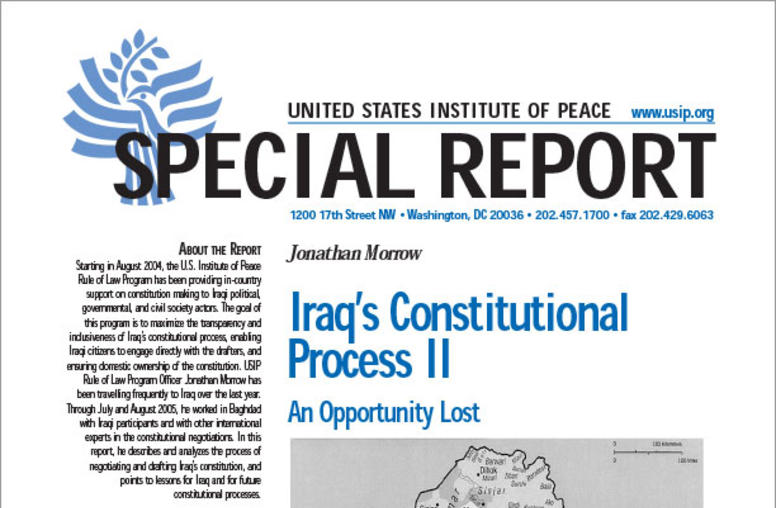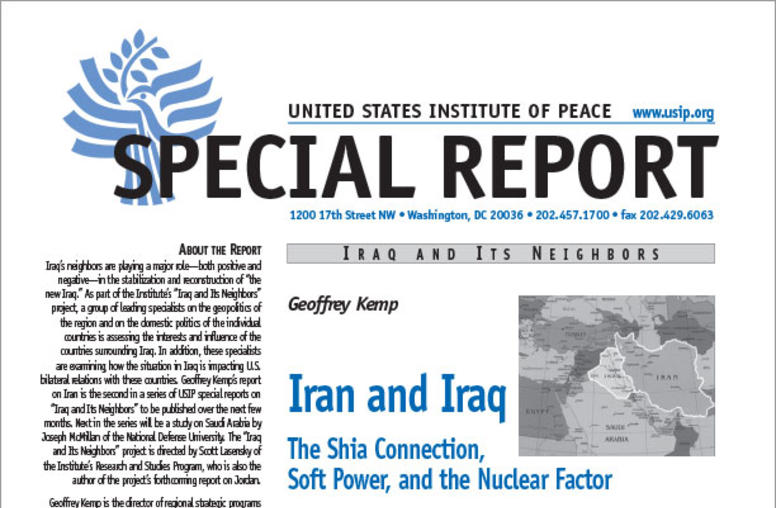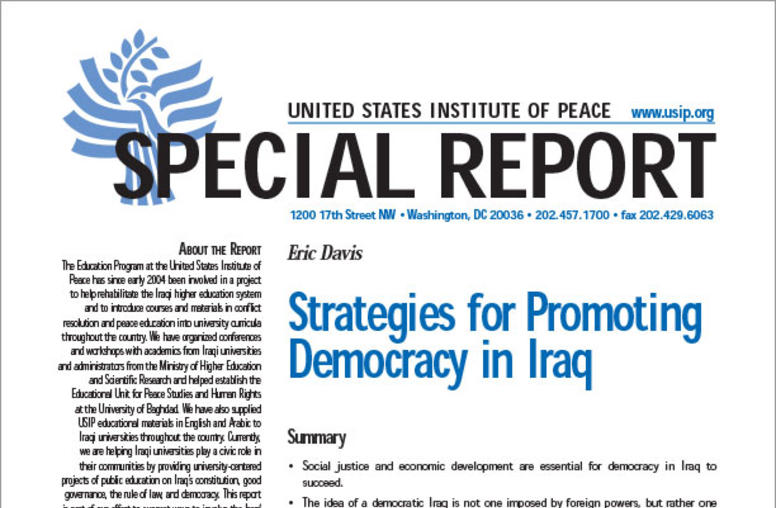Publications
Articles, publications, books, tools and multimedia features from the U.S. Institute of Peace provide the latest news, analysis, research findings, practitioner guides and reports, all related to the conflict zones and issues that are at the center of the Institute’s work to prevent and reduce violent conflict.
Iraq's Constitutional Process II: An Opportunity Lost (Arabic Edition)
Summary Even with the approval of a permanent constitution in the October national referendum, Iraq’s future is uncertain. Widespread Sunni Arab opposition to the new constitution has confirmed the existence of a fault line that profoundly divides Iraqi society. The Transitional Authoritative Law (TAL) envisaged a six-and-a-half-month, transparent, participatory, and orderly constitutional process. The TAL also provided the option, in Article 61(F), of a further six-month extension....

Iraq's Constitutional Process II: An Opportunity Lost
Summary Even with the approval of a permanent constitution in the October national referendum, Iraq’s future is uncertain. Widespread Sunni Arab opposition to the new constitution has confirmed the existence of a fault line that profoundly divides Iraqi society. The Transitional Authoritative Law (TAL) envisaged a six-and-a-half-month, transparent, participatory, and orderly constitutional process. The TAL also provided the option, in Article 61(F), of a further six-month extension....

Iran and Iraq: The Shia Connection, Soft Power, and the Nuclear Factor
Summary Predominantly Shiite Iran emerges from the aftermath of Saddam Hussein's fall with considerable power and influence in Iraq as Iraqis themselves struggle to acquire a semblance of unity and forge a new political order acceptable to Iraq's three key groups: Shia, Kurds, and Sunnis. Iran's leaders meet with Iraq's most influential personality, Grand Ayatollah Ali al-Sistani; American diplomats do not meet with Sistani. Iraq's new elected leaders make visits to Tehran and negotia...
Oral Histories: The Iraq Experience Project
The Iraq Experience Project is designed to collect, distill, and disseminate lessons learned from U.S. government officials, military officers, and contractors who served in the Coalition Provisional Authority in Iraq. Using a combination of tools from printed reports to interactive DVDs and interviews collected in 2004, the Iraq Experience Project seeks to help U.S. civilian and military personnel by providing the training and skills needed for Americans serving in Iraq and beyond.
Draft Constitution Gained, but an Important Opportunity Was Lost
This USIPeace Briefing discusses the possible outcomes of Iraq's October 15 national referendum in light of the constitutional process.
Iraq at a Juncture: Constitution, Referendum and Elections
This USIPeace Briefing analyzes a series of meetings held by the Institute's Iraq Working Group on the constitution-making process in Iraq.
Strategies for Promoting Democracy in Iraq (Arabic Edition)
Summary Social justice and economic development are essential for democracy in Iraq to succeed. The idea of a democratic Iraq is not one imposed by foreign powers, but rather one that Iraqis themselves vigorously support. Iraq has a tradition and history of democracy that can help promote the successful establishment of a democratic form of government in post–Saddam Hussein Iraq.

Strategies for Promoting Democracy in Iraq
The Education program at the United States Institute of Peace has since early 2004 been involved in a project to help rehabilitate the Iraqi higher education system and to introduce courses and materials in conflict resolution and peace education into university curricula throughout the country
The Iraqi Constitution: Progress, But Problems Ahead
This USIPeace Briefing recaps an August 23 Institute event discussing the progress, and potential problems, of the proposed Iraqi constitution.
A Critical Triangle: Iraq, Iran and the United States
USIPeace Briefing discussing the challenges posed to the U.S. as a result of the close relationship between Iraq and Iran.